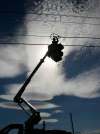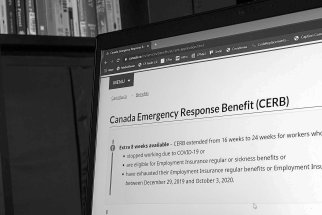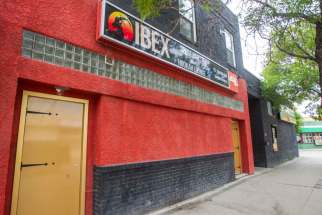Bickering scuttles $55-M internet project for northern Manitoba
Read this article for free:
or
Already have an account? Log in here »
To continue reading, please subscribe:
Monthly Digital Subscription
$0 for the first 4 weeks*
- Enjoy unlimited reading on winnipegfreepress.com
- Read the E-Edition, our digital replica newspaper
- Access News Break, our award-winning app
- Play interactive puzzles
*No charge for 4 weeks then price increases to the regular rate of $19.00 plus GST every four weeks. Offer available to new and qualified returning subscribers only. Cancel any time.
Monthly Digital Subscription
$4.75/week*
- Enjoy unlimited reading on winnipegfreepress.com
- Read the E-Edition, our digital replica newspaper
- Access News Break, our award-winning app
- Play interactive puzzles
*Billed as $19 plus GST every four weeks. Cancel any time.
To continue reading, please subscribe:
Add Free Press access to your Brandon Sun subscription for only an additional
$1 for the first 4 weeks*
*Your next subscription payment will increase by $1.00 and you will be charged $16.99 plus GST for four weeks. After four weeks, your payment will increase to $23.99 plus GST every four weeks.
Read unlimited articles for free today:
or
Already have an account? Log in here »
Hey there, time traveller!
This article was published 15/09/2020 (1917 days ago), so information in it may no longer be current.
OTTAWA — A dispute between two Indigenous groups has prompted the Trudeau government to pull the plug on a multimillion-dollar project to install broadband internet to northern Manitoba, considered the worst area outside the territories for internet connectivity.
After two years of work, and likely millions of dollars spent, Industry Canada gave notice Tuesday it will not proceed with the $55.5-million Wekitowak project to connect First Nations.
The federal government argued a larger Internet fund, which will be launched soon, is a faster way for reserves to get connected to broadband. It rejected requests from the band council that’s spearheading the project to try to get chiefs back on board.
“It’s not the happiest day; that’s for sure,” said Jeremy McKay, a lawyer for Mathias Colomb First Nation in northern Manitoba, which was the driving force behind the Wekitowak project.

In 2018, Premier Brian Pallister joined federal Industry Minister Navdeep Bains to announce a joint $55.5-million fund to connect 72 remote communities across the province by March 2021.
Weeks before that announcement, Ottawa merged two competing bids; both had a mix of First Nations support. However, the partnership dissolved within two months.
One bid, Clear Sky Connections, had the endorsement of the Assembly of Manitoba Chiefs, and the support of some reserves that felt they’d be beholden to a private Internet company under the Wekitowak project.
Ottawa favoured the Wekitowak bid, arguing it would be cheaper because it was partnered with RFNow of Brandon, which would cover construction costs in exchange for rights to provide broadband for the first decade.
On Tuesday, Industry Canada told Wekitowak officials it had deemed the project no longer eligible for money from the Connect to Innovate fund.
Ottawa said reserves could instead be connected via the Universal Broadband Fund, a $1.7-billion grant program announced by the Trudeau government, which has yet to start.
The Liberals say they want to expedite the 10-year program, given how many Canadians are working from home due to the pandemic.
McKay said the Wekitowak bid is “inherently optimistic” it can be a part of the new plan.
A complicating factor is that the group may have lost the chance to lean on Manitoba Hydro.
The province had agreed to allow Wekitowak and Clear Sky Connections to use Hydro’s dormant optic-fibre cables, meaning they only had to link communities to Hydro’s main lines.
However, a recent request-for-proposals for private access to those fibre-optic lines could suggest the arrangement is no longer valid.
This fall, the Free Press published internal records from Industry Canada that show the original 2018 plan was plagued by problems.
Firstly, chiefs were confused about which bids they’d endorsed, because two bids had joined forces, were renamed and then separated.
Officials had to continually get the consent of chiefs, who rotated during band elections over the two years. An attempt at mediation failed.
Secondly, Indigenous Service Canada separately gave Clear Sky funding for a smaller fibre-optic project near Thompson, prompting outcry from the Wekitowak bid.
As recently as two weeks ago, McKay said Wekitowak was urging Ottawa to get everyone back at the table to resolve the dispute.
“We acknowledged there were significant obstacles that needed to be navigated, before the Wekitowak project could truly be viable,” said McKay. “From our perspective, (the federal government) participated in creating those challenges, and therefore they needed to be at the table, in terms of finding a solution.”
For a year, the community pleaded to meet with Rural Economic Development Minister Maryam Monsef or her predecessor.
Instead, Ottawa kept asking Wekitowak this summer for documentation. It insisted it couldn’t proceed until all reserves were back on board.
dylan.robertson@freepress.mb.ca












